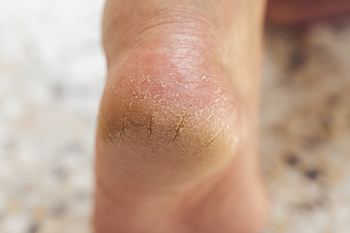 Diabetes, a chronic condition marked by high blood sugar levels, can significantly affect foot health, leading to complications such as cracked heels. Diabetes impairs circulation and causes neuropathy, which reduces sensation in the feet. This lack of sensation makes it harder to notice dry skin and small cracks, allowing them to worsen unnoticed. Cracked heels occur when the skin surrounding the heels becomes dry and thickens, leading to fissures that can be painful and prone to infection. Poor blood circulation in diabetic patients further hampers the healing process, increasing the risk of complications. To prevent and treat cracked heels, maintain proper foot hygiene and moisturize daily, focusing on the heels. Avoid soaking feet too long, as this can dry out the skin further. Wear supportive, well-fitting shoes to reduce pressure on the heels, and regularly inspect feet for cracks or sores. For persistent or severe cases of cracked heels, it is suggested that you seek the counsel of a podiatrist who can provide specialized care and recommend appropriate treatments.
Diabetes, a chronic condition marked by high blood sugar levels, can significantly affect foot health, leading to complications such as cracked heels. Diabetes impairs circulation and causes neuropathy, which reduces sensation in the feet. This lack of sensation makes it harder to notice dry skin and small cracks, allowing them to worsen unnoticed. Cracked heels occur when the skin surrounding the heels becomes dry and thickens, leading to fissures that can be painful and prone to infection. Poor blood circulation in diabetic patients further hampers the healing process, increasing the risk of complications. To prevent and treat cracked heels, maintain proper foot hygiene and moisturize daily, focusing on the heels. Avoid soaking feet too long, as this can dry out the skin further. Wear supportive, well-fitting shoes to reduce pressure on the heels, and regularly inspect feet for cracks or sores. For persistent or severe cases of cracked heels, it is suggested that you seek the counsel of a podiatrist who can provide specialized care and recommend appropriate treatments.
Cracked heels are unsightly and can cause further damage to your shoes and feet. If you have any concerns, contact Thomas Bobrowski, DPM from InStride Crystal Coast Podiatry. Our doctor can provide the care you need to keep you pain-free and on your feet.
Cracked Heels
Cracked heels appear unappealing and can make it harder for you walk around in sandals. Aside from looking unpleasant, cracked heels can also tear stockings, socks, and wear out your shoes. There are several methods to help restore a cracked heel and prevent further damage.
How Do You Get Them?
Dry skin is the number one culprit in creating cracked heels. Many athletes, walkers, joggers, and even swimmers suffer from cracked heels. Age and skin oil production play a role to getting cracked heels as well.
Promote Healing
Over the counter medicines can help, especially for those that need instant relief or who suffer from chronic dry feet.
Wear Socks – Wearing socks with medicated creams helps lock in moisture.
Moisturizers – Applying both day and night will help alleviate dryness which causes cracking.
Pumice Stones – These exfoliate and remove dead skin, which allows for smoother moisturizer application and better absorption into the skin.
Change in Diet
Eating healthy with a well-balanced diet will give the skin a fresh and radiant look. Your body responds to the kinds of food you ingest. Omega-3 fatty acids and zinc supplements can also revitalize skin tissue.
Most importantly, seek professional help if unsure how to proceed in treating cracked heels. A podiatrist will help you with any questions or information needed.
If you have any questions, please feel free to contact our office located in New Bern, NC . We offer the newest diagnostic and treatment technologies for all your foot care needs.
